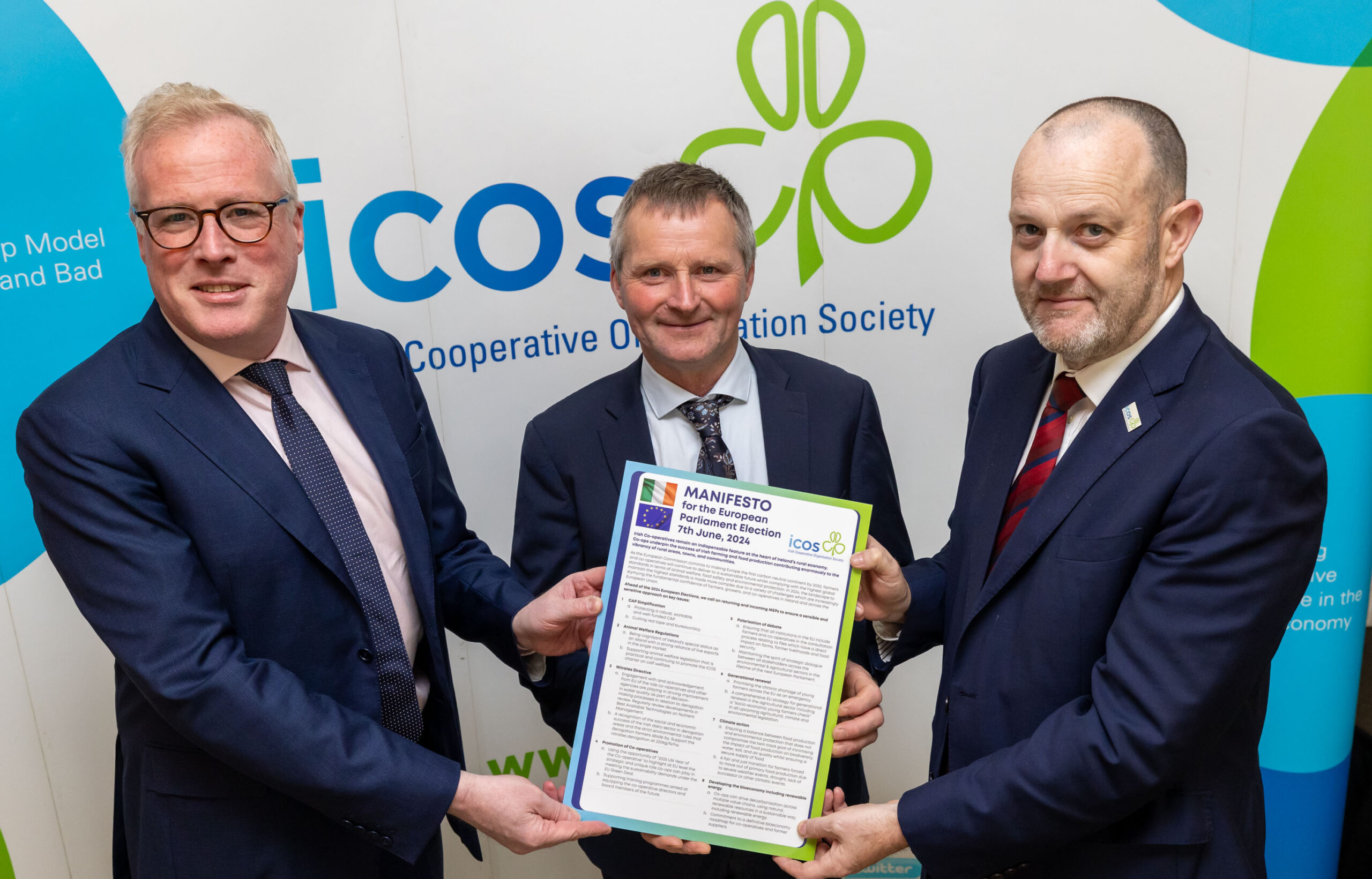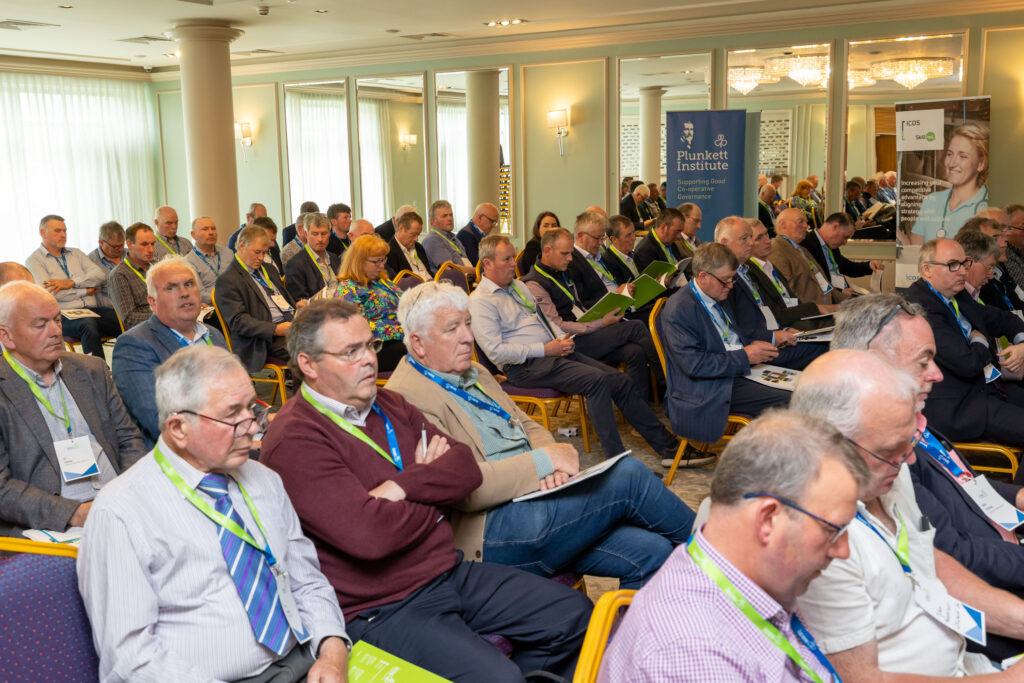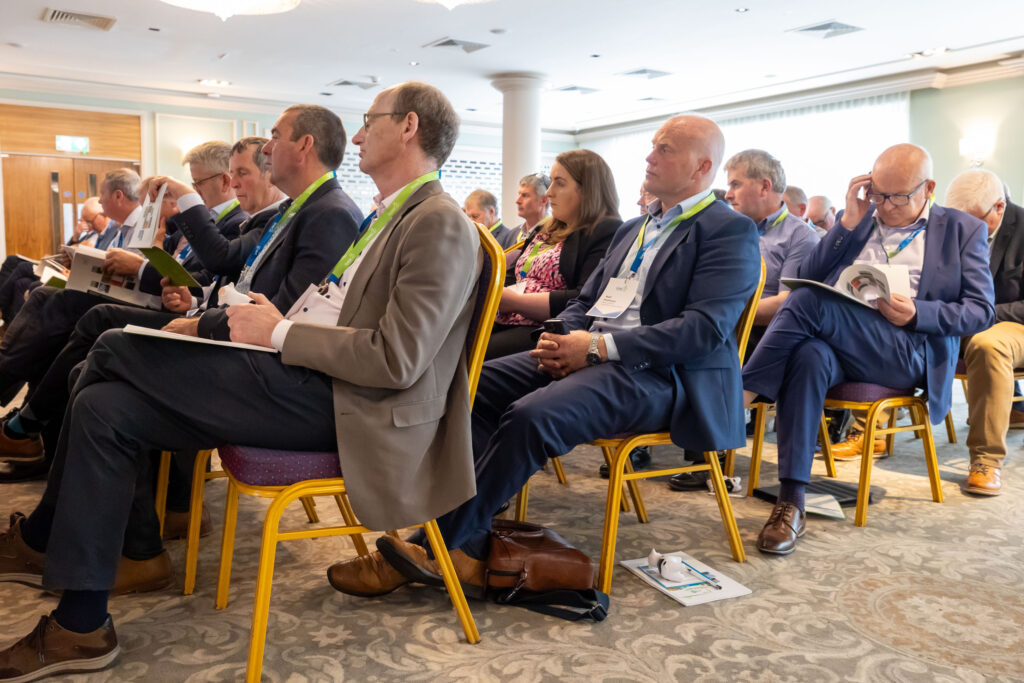ICOS highlights Urgent Needs of Farmers and calls for clarity on Biomethane Strategy
 Damien O’Reilly, ICOS EU Affairs & Communications Manager; ICOS President Edward Carr and ICOS CEO TJ Flanagan with the manifesto for the European Parliament Election 2024 at the 129th ICOS agm in Portlaoise on Friday 31 May 2024.
Picture: Alf Harvey.
Damien O’Reilly, ICOS EU Affairs & Communications Manager; ICOS President Edward Carr and ICOS CEO TJ Flanagan with the manifesto for the European Parliament Election 2024 at the 129th ICOS agm in Portlaoise on Friday 31 May 2024.
Picture: Alf Harvey.
Damien O’Reilly, ICOS EU Affairs & Communications Manager; ICOS president Edward Carr and ICOS CEO TJ Flanagan with the manifesto for the European Parliament Election 2024 at the 129th ICOS agm in Portlaoise on Friday 31 May 2024. Picture: Alf Harvey.
“Narrative must shift from stigmatising to supporting farmers, sustainability and food security” – ICOS President.

At the 129th AGM of the Irish Co-operative Organisation Society (ICOS) held this morning in Portlaoise, attended by Ireland’s co-operative industry leaders, ICOS President Edward Carr addressed the pressing issues facing farmers in a year marked by significant challenges, including poor milk prices, high input costs, adverse weather, and negative public perceptions.
Edward Carr also stressed the critical need for clearer and more decisive action from the government regarding the newly published Biomethane Strategy.
“Farmers are experiencing increasingly difficult circumstances,” said Mr. Carr. “They’ve faced a perfect storm of poor milk prices, stubbornly high input prices, locked-in high overhead costs, and appalling weather. On top of this, the public narrative often treats food producers as if they’re some kind of environmental criminals. This puts immense pressure on our farmers, when factually they are doing more to address sustainability and emissions reduction than many other sectors of our economy.
“People need to wake up to this fact; stop stigmatising and instead support farmers to achieve even more in the interests of food security and necessary climate action, which we 100% acknowledge as a priority for our sector and for Ireland.”
Edward Carr emphasised the substantial progress that farmers have made.
“Our farmers have achieved remarkable advancements in recent years. They’ve switched to low emission spreading, used protected urea, reduced nitrogen use, adopted clover and multi-species swards, made leaps in breeding efficiency, utilised sexed semen, improved efficiency in the suckler herd, adopted electronic bidding, and genotyped cows and calves.”
“We need to continue showing leadership and guide our organisations and members through even more challenging changes in the coming years.
“We must continue our progress on water quality, knowing that failure is not an option. Adopting nearly 100% of the Teagsac Marginal Abatement Cost Curve curve measures is essential to meet our emissions targets. The MACC helps us visualise the potential of greenhouse gas abatement measures and how to allocate our resources accordingly.
“Our industry needs a sustainable dairy calf-to-beef system that meets customer and stakeholder expectations while protecting beef farmers’ livelihoods. Our precious tillage sector needs protection as we all rely on their straw and grain. Embracing the bio-economy is critical to decarbonise our supply chains and maximise waste value. Furthermore, we must attract new blood into farming, into co-op membership and leadership to compete in a booming economy. Finally, we need to better defend the reputation of our food production system and pool our resources to counter well-to opposition to the legitimate expectations we have for our livelihoods, the protection of our environment and the wellbeing of our rural communities.”
Government must step up
“The government and politicians must step up. They must ensure fair rules for water quality improvements, provide adequate funding for slurry storage capacity, fully fund the ASSAP programme, and properly finance the new biomethane strategy.
“Government agencies such as the EPA need to clearly acknowledge the science associated with each of our improvement measures, including the reasonable timeframe over which they could be expected to deliver results.”
Edward Carr emphasised the urgency of protecting the rural economy.
“We cannot reduce our production capacity below current necessary levels. The CAP and national funding must support farmers and rural communities adequately and consistently. Farmers and their co-operatives have invested billions to develop a world-class dairy industry that has transformed the rural and national economy, and now it faces a significant threat that must be addressed.”

Picture: Alf Harvey.
Biomethane Strategy
Addressing the recently published Biomethane Strategy, Edward Carr said, “ICOS welcomes this week’s publication, but we need far more clarity. The document lacks detail on how capital grants will operate, specifics around the Renewable Heat Obligation (RHO), and the formation of an effective industry charter. The current €40 million capital funding is woefully inadequate.
“Clear guidelines are essential to create certainty for investment decisions and to engage farmers and co-operatives effectively. We see opportunities for additional income streams for farmers and rural regions; for example integrating slurry storage and nutrient management solutions, and kick-starting Ireland’s bioeconomy at a commercial scale.
“We welcome the reference to ‘Project Development Assistance’ for co-operative projects and insist that co-operatives must be fully involved in deploying an agri-led AD strategy. We are eager to participate in developing the industry charter and consulting with the Department on how Project Development Assistance can work for co-operatives. However, we urgently need clarity around capital grants, the RHO, and other critical definitions and particularly sustainability.”
Call to Action
“In summary, this is the number one priority for all of us over the coming months,” Carr concluded. “Government needs to robustly defend our grass-based production system and bring substantial financial support to the table. The EU funding rules cannot be an excuse for inaction. We need innovative solutions and unwavering commitment to protect our industry. Time is short, and we must act decisively. Let’s not waste it.”
The Irish Co-operative Organisation Society (ICOS) is the umbrella body for the co-operative movement in Ireland – including dairy processing co-operatives and livestock marts – whose associated businesses have a combined turnover in the region of €16 billion, with some 175,000 individual members, employing 12,000 people in Ireland, and a further 24,000 people overseas. In total, there are some 1,000 co-ops in Ireland, and the largest 100 organisations employ approximately 40,000 people.
A note for your diary: Saturday 6th July is International Day of Co-operatives 2024.